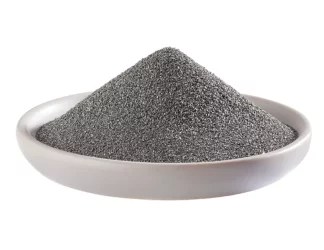Ferrosilicon Spherical Powder Fesi Powder
Ferrosilicon Spherical Powder (FeSi Powder) is a high-performance alloy powder composed primarily of iron (Fe) and silicon (Si), engineered into spherical particles through gas atomization. This morphology ensures excellent flowability, packing density, and consistent performance, making it ideal for welding consumables, powder metallurgy, thermal spraying, and 3D printing (additive manufacturing).
With precise control over particle size distribution and chemical composition, our FeSi powder supports high-efficiency processing and improved material properties across a range of industrial applications. Princeton Powder offers Soft Magnetic Ferrosilicon FeSi 6.5 for Laser Beam Melting.
Ferrosilicon Spherical Powder Fesi Powder
Formula | FeSi, FeSiAl, FesiCr |
Synonyms | FeSi Soft magnetic powder, FeSiAl spherical powders, FesiCr powder, FesiAl Soft magnetic powder, FesiCr Soft magnetic powder |
Appearance | Black Powder |
Particle Size | 15-53 um, 45-105 um, can be customized upon request |
Purity | 99% min |
Density | 6.7 g/cm 3 |
Tap Density | 4.8 g/cm³ |
Apparent density | 4.32 g/m3 |
Description of FeSi Powder
Fe-Si (Iron-Silicon), also known as silicon steel or electrical steel, is widely used in electrical and magnetic applications due to its excellent magnetic properties.
Fe-Si (Iron-Silicon) powders are widely used in soft magnetic applications. There are mainly three different Fe-Si-based powders:
Soft Magnetic Powder (Fe-Si)
- Composition: Primarily composed of iron (Fe) and silicon (Si), typically in the range of 1-6% silicon by weight.
- High Permeability: Soft magnetic Fe-Si powder exhibits high magnetic permeability, making it ideal for electromagnetic applications.
- Low Coercivity: It has low coercivity, meaning it requires a minimal external magnetic field to become magnetized.
- Low Core Loss: Fe-Si powders are known for their low core loss, making them energy-efficient in AC applications.
- Saturation Magnetization: These powders provide high saturation magnetization, which is essential for strong magnetic fields.
FeSiAl Powder
- Composition: A ternary alloy composed of iron (Fe), silicon (Si), and aluminum (Al). The typical composition is Fe-9%Si-6%Al.
- Soft Magnetic Material: FeSiAl powder is a soft magnetic material with high magnetic permeability and low coercivity.
- High Resistivity: The addition of aluminum increases the electrical resistivity, reducing eddy current losses.
- Mechanical Properties: Aluminum enhances the mechanical properties, making the powder more durable and easier to process.
- Thermal Stability: FeSiAl powders have excellent thermal stability, suitable for high-temperature applications.
FeSiCr Powder
- Composition: A ternary alloy consisting of iron (Fe), silicon (Si), and chromium (Cr). The composition typically includes about 10-20% Si and 1-10% Cr.
- Corrosion Resistance: Chromium enhances the corrosion resistance of the powder, making it suitable for harsh environments.
- Magnetic Properties: FeSiCr powder maintains good magnetic properties, including high permeability and low coercivity.
- Oxidation Resistance: The presence of chromium also improves the oxidation resistance, adding to its durability.
Princeton Powder is a leading supplier of Soft magnetic Fe-Si powder. We specialize in a comprehensive range of soft magnetic material products and possess extensive expertise in additive manufacturing (3D printing) industry. FeSiAl Powder and FeSiCr Powder are for sale at a competitive price.
Ferrosilicon Spherical Powder (FeSi) Chemical Composition
Ferrosilicon Spherical Powder (FeSi)Particle Size distribution
0-15μm, 15-53μm, 45-105μm, 45-150μm. (Various particle sizes can be customized)

Applications of Ferrosilicon Spherical Powder (FeSi Powder)
- Ferrosilicon (FeSi) Spherical Powder for Welding process
- Ferrosilicon (FeSi) Spherical Powder for Additive Manufacturing (3D Printing)
- Ferrosilicon (FeSi) Spherical Powder for Powder Metallurgy
- Ferrosilicon (FeSi) Spherical Powder for Thermal and Cold Spray Coatings
- Ferrosilicon (FeSi) Spherical Powder for Magnetic and Electrical Alloys
FeSi Spherical Soft Magnetic Alloy Powder Reference
Evaluation of Soft Magnetic Ferrosilicon FeSi 6.5 for Laser Beam Melting
- The electromagnetic properties of soft magnetic materials are of decisive importance for the efficiency, running characteristics and performance of electric motors. To fulfil the target criteria as favorably as possible, high requirements are placed on the processing techniques of soft magnetic materials with regard to accuracy, reproducibility and quality. Through continuous improvements, novel additive manufacturing processes are also able to meet these requirements. They can already be a pragmatic alternative, where conventional processes reach their technological or economical limits. Laser beam melting of metals in a powder bed is one of the processes in which a workpiece is created from shapeless metal powder. Due to its generative character, new design elements can be utilized to build lightweight motors or to manufacture them economically in small quantities.
The principal ferroalloys are ferromanganese, ferrochromium, ferromolybdenum, ferrotitanium, ferrovanadium, ferrosilicon, ferroboron, and ferrophosphorus. These are brittle and unsuitable for direct use in fabricating products, but they are useful sources of these elements for the alloy steels.
- Fe-Si (Iron-Silicon): Offers high magnetic permeability and low core loss.
- Fe-Ni (Permalloy): High permeability and low coercivity, ideal for magnetic shielding.
- Fe-Co (Iron-Cobalt): High saturation magnetization, used in high-performance applications.
- Fe-Si-Al (Sendust): Low core loss and high resistivity, suitable for high-frequency applications.
- Fe-Ni-Mo (Molypermalloy): Combines low coercivity with high permeability, used in precision inductors.
Main application processes for Soft Magnetic Powders:
- Powder Metallurgy: Compacting and sintering for cores in transformers and motors.
- Injection Molding: Molding complex shapes for sensors and inductors.
- Tape Casting: Creating thin magnetic sheets for transformers.
- Hot Pressing: High-pressure forming for high-performance components.
- Additive Manufacturing: 3D printing custom magnetic parts.
- Spray Forming: Applying magnetic coatings on surfaces.

